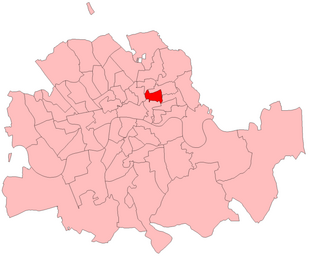Wednesbury was a borough constituency in England's Black Country which returned one Member of Parliament to the House of Commons of the Parliament of the United Kingdom from 1868 until it was abolished for the February 1974 general election.
The Cockermouth by-election, 1906 was a by-election held on 3 August 1906 for the British House of Commons constituency of Cockermouth.
The Hastings by-election 1908 was a Parliamentary by-election. Hastings returned one Member of Parliament to the House of Commons of the United Kingdom, elected by the first past the post voting system.
Arthur Acland Allen was a British Liberal Party politician who served as a Member of Parliament (MP) between 1906 and 1918.
The Stalybridge by-election was a Parliamentary by-election. It returned one Member of Parliament to the House of Commons of the United Kingdom, elected by the first past the post voting system.
The Shrewsbury by-election, 1913 was a parliamentary by-election held in England in April 1913 to elect a new Member of Parliament (MP) for the borough of Shrewsbury in Shropshire.

The Bethnal Green South West by-election was a Parliamentary by-election. It returned one Member of Parliament to the House of Commons of the United Kingdom, elected by the first past the post voting system.
The Carmarthen District by-election, 1912 was a Parliamentary by-election held in the United Kingdom on 29 January 1912 for the Carmarthen District in Wales. The constituency of Carmarthen District of Boroughs, was centred on the boroughs of Carmarthen and Llanelli. It returned one Member of Parliament to the House of Commons of the Parliament of the United Kingdom, elected by the first past the post voting system.
The Manchester South by-election was a Parliamentary by-election. It returned one Member of Parliament to the House of Commons of the Parliament of the United Kingdom, elected by the first past the post voting system.
The Reading by-election was a Parliamentary by-election. It returned one Member of Parliament to the House of Commons of the United Kingdom, elected by the first past the post voting system.
The High Peak by-election was a Parliamentary by-election. It returned one Member of Parliament to the House of Commons of the United Kingdom, elected by the first past the post voting system.
The Dumfries Burghs by-election was a Parliamentary by-election. It returned one Member of Parliament to the House of Commons of the United Kingdom, elected by the first past the post voting system.
The Edinburgh East by-election was a Parliamentary by-election. It returned one Member of Parliament to the House of Commons of the United Kingdom, elected by the first past the post voting system.
The Chelmsford by-election was a Parliamentary by-election. It returned one Member of Parliament to the House of Commons of the United Kingdom, elected by the first past the post voting system.
The Norwich by-election was a Parliamentary by-election. It returned two Members of Parliament to the House of Commons of the United Kingdom, elected by the first past the post voting system.
The Ilkeston by-election was a Parliamentary by-election in Derbyshire. It returned one Member of Parliament to the House of Commons of the United Kingdom, elected by the first past the post voting system.

Orkney and Shetland is a constituency of the House of Commons of the Parliament of the United Kingdom. It elects one Member of Parliament (MP) by the first past the post system of election. In the Scottish Parliament, Orkney and Shetland are separate constituencies.
The Basingstoke by-election, 1920 was a parliamentary by-election for the British House of Commons constituency of Basingstoke on 31 March 1920.

The Tower Hamlets St George by-election was a Parliamentary by-election. It returned one Member of Parliament to the House of Commons of the United Kingdom, elected by the first past the post voting system. It was held on 1 March 1910.
The Banffshire by-election was a Parliamentary by-election. It returned one Member of Parliament to the House of Commons of the United Kingdom, elected by the first past the post voting system.








